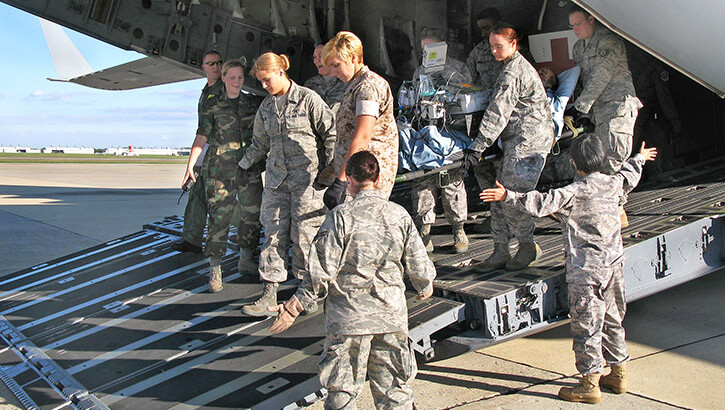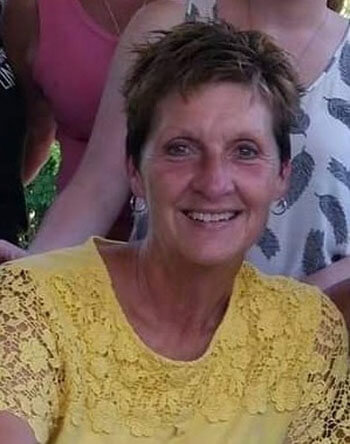Meet the Matriarch of Wounded Warrior Caregivers at Walter Reed
 Service men and women from the 779th Aeromedical Staging Facility at Andrews Air Force Base, Maryland, transported a severely wounded soldier being medically evacuated from Iraq for advanced treatment care at Walter Reed Army Medical Center in Washington in this photo from 2009 (Department of Defense photo by Donna Miles).
Service men and women from the 779th Aeromedical Staging Facility at Andrews Air Force Base, Maryland, transported a severely wounded soldier being medically evacuated from Iraq for advanced treatment care at Walter Reed Army Medical Center in Washington in this photo from 2009 (Department of Defense photo by Donna Miles).
Linda Rasnake has succinct advice for people who are new to the caregiving role. Get a day planner. Take notes. Google what you don't know. Ask a lot questions - and don't be intimidated.
Rasnake is a military caregiver who has touched the lives of thousands of wounded warriors and their families in recent years. She has become a sort of matriarch for the tightly knit caregiver community. And the reason that she has been such an effective advocate for military families in crisis is that she has been there herself.
Rasnake's husband, a medically retired Army sergeant 1st class, suffered a bad fall during a training accident. In 2006, his injuries began to grow worse and he eventually underwent more than a dozen surgeries.
Rasnake spent months in and out of military hospitals while supporting her husband and she often felt that nobody really understood the challenges she was facing.
"The one thing that used to drive me crazy is when a [hospital] employee would say, "I know what you're going through." Well - I guarantee you don't," she said.
"With me, [the caregivers] know that I know what they're going through. I've been through the struggles. Living in a hotel, making a makeshift kitchen out of a closet - the whole nine yards - and, still paying your mortgage or rent back home."
"We just figure out a way to make it work," she said
In the past decade, Rasnake has become a prominent leader and advocate for wounded warriors and their caregivers. She grew into the role naturally as she began spending more time in Washington, D.C. - living out of a hotel for more than a year - while her husband was getting care at Walter Reed National Military Medical Center (WRNMMC) in Bethesda, Maryland.
"I just couldn't sit around and do nothing and wait for appointments," Rasnake recalled about her eventual move from Arizona to Washington, D.C. "So, I kind of started pulling the fabulous nonprofits together and doing big, big events, and really doing anything that I could."
Relentlessly positive and a self-described workaholic, Rasnake was a volunteer at first, but then she was the first person hired for the Warrior Transition Brigade at Walter Reed Bethesda in 2007. Since then, she has tapped her creativity to organize annual family-focused events. She helps with fundraising efforts. Most mornings she posts on social media to lift the spirits of military caregivers and spread the word about small-group events.
She's the person caregivers call because they know she'll listen. Rasnake feels it's her job to help in any way possible, even if the caller hasn't been at Walter Reed Bethesda for 10 years or more.
 Linda Rasnake, the family readiness support assistant at Walter Reed National Military Medical Center in Bethesda, Maryland (Courtesy of Linda Rasnake).
Linda Rasnake, the family readiness support assistant at Walter Reed National Military Medical Center in Bethesda, Maryland (Courtesy of Linda Rasnake).
The whirlwind
"She's been wonderful," said Jan Burkhardt, the mother of a current patient at Walter Reed Bethesda, speaking about Rasnake. "She has been so supportive."
"Burkhardt's son, Army Capt. Clayton Burkhardt, was flying a CH-47 Chinook helicopter in June during exercises in Germany when he experienced a seizure. The crew was able to land safely, but a subsequent MRI revealed a brain tumor. In August, the Army captain was medically transported to Walter Reed Bethesda.
Doctors said the treatment would be tricky - the tumor was in an area of the brain that affects speech, making it difficult to remove. But when a biopsy showed the tumor to be a malignant form of cancer, they brought in a Walter Reed Bethesda neuro-oncologist who was also affiliated with the nearby National Institutes of Health (NIH). The tumor was surgically removed at the National Institutes of Health this fall, on Nov. 12.
"It was very scary," Burkhardt said. "He's doing really well," but has headaches and some speech difficulties. Though he is back at Walter Reed Bethesda, the NIH told mother and son that they'd help him with speech therapy for as long as he needs it.
Meanwhile, Rasnake arranged a small event just for caregivers of loved ones with cancer.
It'll be a tough road for Burkhardt. He'll have to start radiation treatment in late December, followed by a lengthy period of chemotherapy. But his mother feels fortunate that she and her husband are retired travel to the Washington area when needed.
Still, the mother said: "It's been really tough."
"It's been a whirlwind. So we've really appreciated Linda and her support, and other folks have been really helpful."
Undaunted
During the height of the COVID-19 pandemic lockdown in 2020, Rasnake said she could only stay away from the hospital for about a month before telling her boss: "I will figure out how to get people together, safely."
"With support from not-for-profit groups, she began organizing "grab-and-go" lunches - meals in to-go boxes delivered to Building 62, known as Tranquility Hall, aboard Naval Support Activity Bethesda, the same base that WRNMMC is located. Masked patients would pick up their meals and head back to their rooms. She also set up tables and handed out hand sanitizer, paper products, masks and gloves for patients and their families.
"At least I had eye-to-eye contact, and that was huge," she recalled. "COVID, for me, took the personal out of what we do, and I really - as did they - missed the personal side of life. Especially where we're at. You see a mom who's struggling because her son has cancer. A year ago, you just wanted to reach out and give her a hug, because that's what she needs. Just that instant bond of hugging her and saying, "I'm here for you. You're not going through this alone.'"
Recognizing that her son's recovery will be a long-term process, Burkhardt said she may find herself helping someone one day, too.
"I hope so," she said. "We're in it for the long haul now."